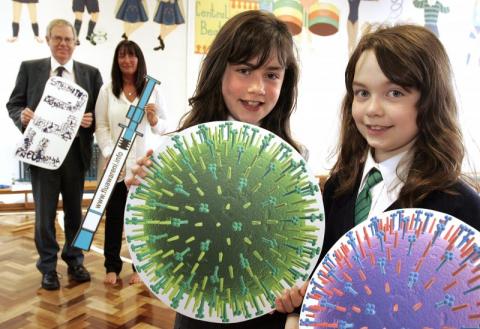Introducing flu vaccine for children

The Public Health Agency (PHA) is today launching the first phase of a programme that will offer flu vaccine to all children aged two to 16 years inclusive. This will help protect children against flu and reduce its spread.
This year the vaccine will be offered to children aged two and three years and to those in school year primary six.
Dr Richard Smithson, Consultant in Health Protection at the PHA, said: “The flu virus spreads easily and quickly, infecting both adults and children alike. Flu can cause the same unpleasant symptoms in children as it does with adults – fever, chills, aching muscles and joints, headache and extreme tiredness. These symptoms can last between two and seven days and for some can lead to serious illness and result in a stay in hospital. This can lead to days spent in bed rather than being at school or nursery, with parents having to stay at home to care for sick children. This can cause considerable inconvenience for the whole family, made all the more difficult if one or both of the parents catches flu as well.
“The flu virus spreads through the air when people cough and sneeze without covering their nose and mouth, and because young children don’t always cover their noses or mouths when coughing or sneezing, the virus can spread very quickly among them.”
Protecting Children
Dr Smithson continued: “During Autumn 2013, all healthy children in the phased introduction groups, which are children aged two and three years on 1 September 2013 and those in primary six, will be offered the flu vaccine as part of the seasonal flu programme. Most children will receive the vaccine via a quick and painless nasal spray. The nasal vaccine is being used because it has been shown to provide greater protection for children than the flu injection. This vaccine has been used in America now for several years and millions of doses have been given. We can therefore be very confident in knowing that it is a safe and effective vaccine.
“We encourage parents and guardians of all two and three year olds and primary six children to get their child vaccinated to help protect them against this unpleasant and sometimes serious illness. It will also reduce the risk of passing the disease on to other children or family members, some of whom may be at increased risk of being seriously ill from having the flu.”
Primary six children will receive the vaccination at school and two and three year old children will receive the vaccination through their local GP surgery. At-risk children of all ages should continue to receive the flu vaccine as they have done in previous years. For medical reasons a very small number of children will not be able to receive the nasal vaccine, known as Fluenz®. They will be offered the usual flu vaccine by injection instead. If unsure speak to your GP for advice.
Health Minister Edwin Poots said: “Children in at risk groups, such as those with asthma, heart conditions or cerebral palsy, are already eligible to receive the flu vaccine from their own GP. Following a recommendation from the Joint Committee on Vaccination and Immunisation (JCVI), and advice from my officials, I have decided to roll out the extended programme over the next few years, beginning this year with all 2 and 3 year olds and children in primary year 6. Next year it is intended to offer the flu vaccine to all pre-school and primary school children and from the autumn of 2015 to all children aged 2 to 16 inclusive. I would urge all parents and guardians of eligible children to take up this offer of free flu vaccination whenever the programme begins this autumn.”
The extended flu vaccination programme is being phased in over several years to enable arrangements to be established for full implementation and will eventually cover all children aged between two and 16 years.
For more information about the flu vaccine for 2013/14,visit www.fluawareni.info, or speak to your GP, nurse or member of staff within the school nurse team at your local Health and Social Care Trust.
